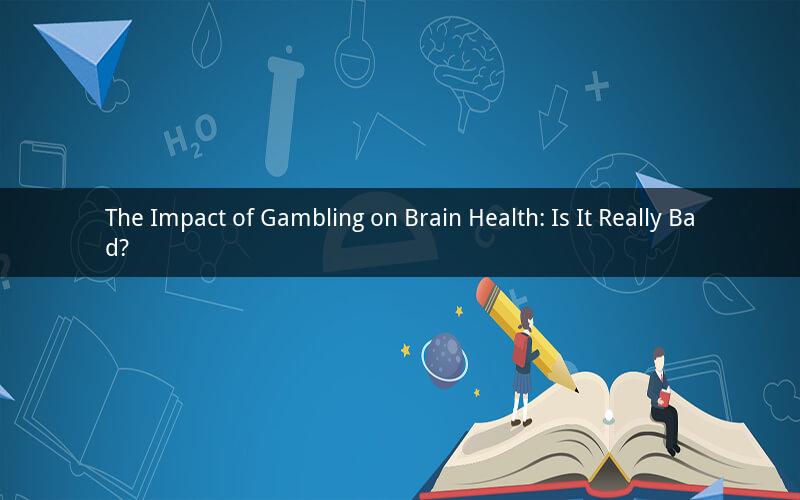
Introduction:
Gambling has been a popular form of entertainment for centuries. However, with the rise of online gambling, it has become more accessible and convenient than ever before. Many people enjoy the thrill of gambling, but there is growing concern about its potential impact on brain health. In this article, we will explore whether gambling is truly bad for your brain and discuss the potential consequences.
1. Understanding the Brain's Role in Gambling:
The brain is a complex organ that plays a crucial role in gambling. When you engage in gambling activities, various regions of your brain are activated, including the prefrontal cortex, the limbic system, and the reward pathway. These regions are responsible for decision-making, emotional regulation, and the experience of pleasure.
2. The Reward Pathway and its Connection to Gambling:
One of the most significant areas of the brain affected by gambling is the reward pathway. When you win a bet, your brain releases dopamine, a neurotransmitter associated with pleasure and reward. This release of dopamine creates a sense of euphoria and reinforces the desire to continue gambling. Over time, this can lead to addiction and potential negative consequences for brain health.
3. The Prefrontal Cortex and Decision-Making:
The prefrontal cortex is another crucial area of the brain affected by gambling. This region is responsible for decision-making, impulse control, and planning. When you engage in gambling, the prefrontal cortex may become less active, making it easier to make impulsive decisions and ignore potential negative consequences. This can lead to financial, social, and psychological problems.
4. Emotional Regulation and the Limbic System:
The limbic system, which includes the amygdala and hippocampus, plays a significant role in emotional regulation. When you experience losses or wins in gambling, these regions of the brain are activated, leading to emotional responses. Prolonged exposure to these emotional responses can disrupt emotional regulation and lead to mood disorders such as depression and anxiety.
5. Potential Consequences of Gambling on Brain Health:
While gambling can provide temporary pleasure, it can also have negative consequences for brain health. Some potential consequences include:
a. Cognitive Impairment: Prolonged and excessive gambling can lead to cognitive impairment, such as memory problems and difficulties with attention and concentration.
b. Addiction: Gambling addiction can have severe consequences for brain health, including changes in brain structure and function.
c. Mental Health Issues: The emotional and psychological stress associated with gambling can lead to mental health issues such as depression, anxiety, and substance abuse.
6. Prevention and Treatment:
If you are concerned about the potential negative impact of gambling on your brain health, it is essential to take preventive measures and seek treatment if needed. Some tips for prevention and treatment include:
a. Set Limits: Establishing limits on the amount of time and money spent on gambling can help prevent addiction and reduce the potential negative impact on brain health.
b. Seek Support: If you are struggling with gambling addiction, seeking support from friends, family, or professionals can be beneficial. Support groups and therapy can provide valuable resources and guidance.
c. Practice Self-Care: Engaging in activities that promote overall well-being, such as exercise, meditation, and hobbies, can help mitigate the negative impact of gambling on brain health.
7. Conclusion:
While gambling can provide temporary pleasure, it is crucial to recognize its potential negative impact on brain health. Understanding the brain's role in gambling, the potential consequences, and the importance of prevention and treatment can help individuals make informed decisions about their gambling habits.
Q1: What are the primary regions of the brain affected by gambling?
A1: The primary regions of the brain affected by gambling include the prefrontal cortex, the limbic system, and the reward pathway.
Q2: How does the reward pathway contribute to gambling addiction?
A2: The reward pathway releases dopamine, a neurotransmitter associated with pleasure and reward, during gambling. This release reinforces the desire to continue gambling and can lead to addiction.
Q3: What are the potential cognitive consequences of gambling on brain health?
A3: The potential cognitive consequences of gambling on brain health include cognitive impairment, such as memory problems and difficulties with attention and concentration.
Q4: How can setting limits help prevent the negative impact of gambling on brain health?
A4: Setting limits on the amount of time and money spent on gambling can help prevent addiction and reduce the potential negative impact on brain health by promoting responsible gambling habits.
Q5: What are some effective treatments for gambling addiction?
A5: Effective treatments for gambling addiction include seeking support from friends, family, or professionals, attending support groups, and engaging in therapy or counseling.